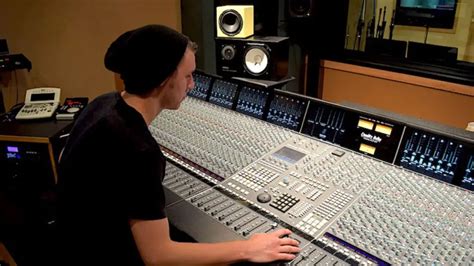Introduction

Step into the captivating realm of music production, where innovation meets artistry. As a music production major, you’ll become a maestro of sound, unlocking the secrets of creating captivating melodies, infectious rhythms, and immersive soundscapes.
What is Music Production?
Music production encompasses the entire process of crafting a song or musical piece from conception to completion. It involves:
- Recording: Capturing audio from instruments, vocals, and other sources
- Mixing: Blending and balancing different recorded tracks
- Mastering: Finalizing the track’s overall sound and preparing it for distribution
Why Major in Music Production?
- Passion: Embark on a career that aligns with your love for music.
- Creativity: Unleash your artistic potential and create unique and compelling sounds.
- Technical Expertise: Master the technologies and techniques used in modern music production.
- Career Advancement: Open doors to a wide range of employment opportunities in the entertainment industry.
Types of Music Production Majors
- Bachelor of Science in Music Production: A comprehensive degree program that emphasizes technical skills and industry knowledge. (Average salary: $53,530 per year)
- Associate of Arts in Music Production: A two-year degree that provides a foundation in the basics of music production. (Average salary: $39,860 per year)
- Master of Science in Music Production: An advanced degree for those seekingspecialized knowledge and research opportunities. (Average salary: $75,850 per year)
Major Benefits
- Artistic Fulfillment: Create and share your own music, expressing yourself through sound.
- Technical Proficiency: Gain expertise in recording, mixing, and mastering techniques using industry-standard software.
- Internship Opportunities: Apply your skills in real-world settings and build connections within the music industry.
- Entrepreneurial Spirit: Learn how to market and promote your music, fostering independence and entrepreneurialism.
Courses
Music production majors typically complete coursework in:
- Music Theory: Fundamentals of music structure, harmony, and analysis
- Audio Engineering: Principles of sound recording, processing, and mixing
- MIDI and Synthesizers: Using technology to create and manipulate music
- Music Business: Legal, financial, and marketing aspects of the music industry
Career Paths
Graduates with music production degrees can pursue careers as:
- Music Producers: Create and produce music for artists and labels
- Audio Engineers: Record, mix, and master audio in studios or on live events
- Sound Designers: Design and create audio for film, video games, and other media
- Music Directors: Oversee the musical aspects of live performances and productions
- Music Educators: Teach music production and related subjects at universities and colleges
Effective Strategies for Success
- Attend workshops and masterclasses: Learn from industry experts and stay updated on the latest techniques.
- Collaborate with other musicians: Expand your skills and network by working with singers, instrumentalists, and producers.
- Build a solid portfolio: Showcase your best work to potential employers and clients.
- Develop strong communication skills: Effectively collaborate and communicate your creative vision with engineers, artists, and clients.
FAQs
Q: What is the job outlook for music producers?
A: The Bureau of Labor Statistics projects an 11% growth in employment for music producers between 2020 and 2030.
Q: Is it difficult to get into the music industry?
A: While competition is fierce, a strong education, experience, and networking can increase your chances of success.
Q: What are the top qualities of a successful music producer?
A: Passion for music, technical proficiency, creativity, business acumen, and networking skills.
Q: Can I produce music without a degree?
A: While a degree is not strictly necessary, it provides a structured learning environment, industry connections, and access to equipment.
Relevant Keywords
- Music production
- Audio engineering
- Mixing
- Mastering
- Music theory
- Music business
Table 1: Degree Programs and Salaries
| Degree | Average Salary |
|---|---|
| Bachelor of Science in Music Production | $53,530 |
| Associate of Arts in Music Production | $39,860 |
| Master of Science in Music Production | $75,850 |
Table 2: Music Production Courses
| Course | Description |
|---|---|
| Music Theory I | Foundations of music structure and harmony |
| Audio Engineering I | Principles of sound recording and processing |
| MIDI and Synthesizers | Using technology to create and manipulate music |
| Music Business I | Legal, financial, and marketing aspects of the music industry |
| Advanced Mixing Techniques | Mixing techniques for clarity, balance, and impact |
Table 3: Career Paths for Music Production Majors
| Career | Description |
|---|---|
| Music Producer | Creates and produces music for artists and labels |
| Audio Engineer | Records, mixes, and masters audio in studios or on live events |
| Sound Designer | Designs and creates audio for film, video games, and other media |
| Music Director | Oversees the musical aspects of live performances and productions |
| Music Educator | Teaches music production and related subjects at universities and colleges |
Table 4: Effective Strategies for Success
| Strategy | Description |
|---|---|
| Attend workshops and masterclasses | Learn from industry experts and stay updated on the latest techniques |
| Collaborate with other musicians | Expand your skills and network by working with singers, instrumentalists, and producers |
| Build a solid portfolio | Showcase your best work to potential employers and clients |
| Develop strong communication skills | Effectively collaborate and communicate your creative vision with engineers, artists, and clients |
